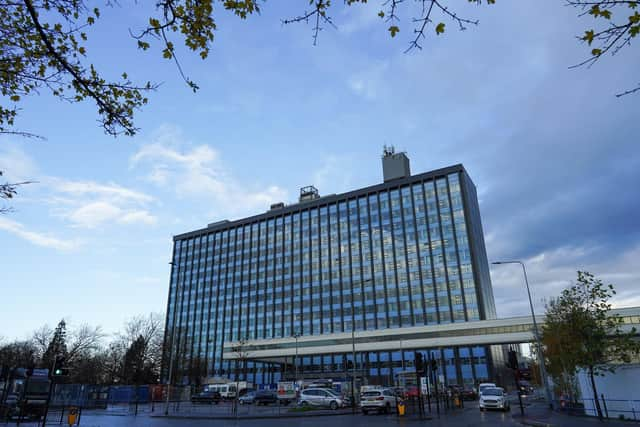Nurse struck off after Yorkshire woman killed herself when she was refused a psychiatric bed
Angela Mays said she is still waiting for the full facts to emerge more than seven years after the death of her 22-year-old daughter Sally Mays in 2014.
Mrs Mays, 70, and her husband Andy, 69, were speaking following a decision by the Nursing and Midwifery Council’s (NMC) Fitness to Practise Committee that nurse Patrick McKee should be struck off.
Advertisement
Hide AdAdvertisement
Hide AdFollowing a 12-day hearing, an independent panel found all the charges against Mr McKee proved including that his “decision to refuse the admission of (Miss Mays) contributed to her death”.


Miss Mays, who had long-standing mental health problems, died at her home in Hull on July 25 2014 after she was turned away by the Humber NHS Foundation Trust crisis team at Miranda House, a specialist in-patient unit in the city, despite being thought to be at real risk of suicide and “extremely vulnerable”.
The panel heard how the police were called to the unit due to the self-destructive behaviour being exhibited by Miss Mays after the decision not to admit her and the officers reluctantly took her home, despite asking the team to reconsider their decision.
The report detailed how one of Mr McKee’s colleagues said to Miss Mays that she would see her on Monday “to which she replied that she would be dead by Monday”.
Advertisement
Hide AdAdvertisement
Hide AdThe report outlined a series of aggravating features in Mr McKee’s case including that he “placed (Miss Mays) at a grave risk of harm”, that he “treated (Miss Mays), who was an extremely vulnerable patient, with a lack of basic fundamental care and compassion”.
It said: “Despite having had numerous opportunities to demonstrate insight and remorse, Mr McKee has demonstrated no insight or remorse.”
Mr McKee, who was a Band 7 Senior Crisis Resolution Nurse who worked in the team which acted as gate-keepers for mental health hospital admissions, did not cooperate with the NMC investigation and, according to the report, described the process as a “circus”.
In December, Mr and Mrs May, who live in Hull, won a High Court battle to have a fresh inquest into their daughter’s death.
Advertisement
Hide AdAdvertisement
Hide AdThis was after it emerged that key evidence had been withheld from the inquest and other investigations about a conversation between a consultant and another health professional which may have provided a further opportunity to prevent Miss Mays’s death.
Mr and Mrs Mays have devoted themselves to full-time campaigning through their justice4sal.org blog to establish the truth about their daughter’s death and prevent anything similar happening to other families.
Mrs Mays said: “It’s not only for Sally and our family, it’s for all the other families who have been appallingly failed by mental health services.”
Mrs Mays said she thought the NMC’s investigation was thorough but should have been done years before.
Advertisement
Hide AdAdvertisement
Hide Ad“I think the hearing and the report is robust,” she said. “My regret is that it’s taken 2,263 days, since I reported McKee post-inquest to the NMC, for them to get to this stage."
She said: “People in acute crisis deserve help and support. Those charged with their care have an obligation to treat them with dignity, respect, kindness and to thoroughly assess them.
“Where they fail to show any human kindness, any respect and don’t do their jobs they will be called out.”
Mrs Mays said that, in the 72 hours prior to her death, her daughter called 999 eight times, attended A&E five times, spoke to her Community Mental Health Team (CMHT) and psychotherapist numerous times and was seen by the Crisis Service on three separate occasions.
Advertisement
Hide AdAdvertisement
Hide AdShe said that, on the last of these occasions, Miss Mays begged to be admitted to hospital for a short in-patient stay as she was in crisis.
Mrs Mays said her daughter died within two hours of being taken back to her home, where she lived alone. She had dialled 999 again for help but the ambulance took 99 mins to arrive.
Mrs Mays said: “I’ve waited seven and a half years. I want the truth to be told. I want the message to be out there. I want professionals out there to heed it. And I want the public to be safe.
“I don’t want a repeat over and over again of the same situation.”
Advertisement
Hide AdAdvertisement
Hide AdShe said: “There needs to be a very, very clear message that this behaviour is not within the code of practice, will not be tolerated, and those that behave in such a way will be held to account. So it’s an absolutely vital message”.
Remembering her daughter, Mrs Mays said: “She was a brilliant, funny, hugely talented, incredibly intelligent girl.”
She recalled how Miss Mays was extremely musical, playing the violin, clarinet and piano, and also loved sport, representing Yorkshire at Badminton and also enjoying ice hockey, running and even boxing.
“We loved her to bits,” she said.
In a statement, the Humber Teaching NHS Foundation Trust said: “We are unable to comment on the specific outcome of the NMC hearing.
Advertisement
Hide AdAdvertisement
Hide Ad“Following the tragic event in 2014, the trust undertook its own investigation and has implemented significant improvements to its processes and strategy since this time, reducing the likelihood of any similar incidents occurring in the future.
“We can also confirm that Mr McKee has not worked at Humber Teaching NHS Foundation Trust for a number of years.
“Whilst we do not comment on individual cases due to confidentiality reasons, it is extremely important to us that we do communicate directly with those affected.”
